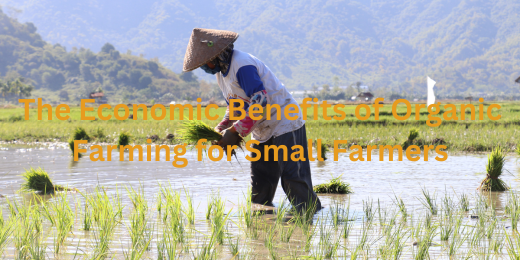
The Economic Benefits of Organic Farming for Small Farmers
Economic benefits of organic farming
Introduction to Organic Farming in South India
Organic farming in South India offers significant benefits compared to traditional farming methods. By preserving soil health, it reduces the need for harmful chemical fertilisers and pesticides. Government initiatives also provide government subsidies to support farmers, encouraging the transition towards environmentally friendly practices that benefit both the land and community.
Switching to organic methods has resulted in numerous economic benefits of organic farming, particularly for small farmers. They enjoy long-term cost savings by using natural compost and avoiding expensive chemical inputs. Organic produce also fetches higher prices, creating a stable income source for those embracing sustainable farming techniques.
Additionally, the rise in demand for organic food products has boosted rural economies. Consumers increasingly prefer purchasing from an organic store that supports local farmers and environmentally conscious practices. This trend ensures that farmers practising organic farming enjoy both financial security and ecological benefits for the future.
Cost Savings from Reduced Input Use
Organic farming significantly reduces the reliance on chemical fertilisers and pesticides, lowering overall input costs for small farmers. By using natural compost and locally sourced organic materials, farmers can cut down expenses. These practices also lead to long-term savings as soil fertility improves, reducing the need for expensive treatments.
The economic benefits of organic farming extend beyond just cost savings. Healthier soil results in higher crop yields and reduced environmental degradation, benefiting both farmers and the land. Sustainable farming methods contribute to overall farm profitability while also promoting eco-friendly agricultural practices in rural communities.
Additionally, government subsidies further support the shift to organic farming. These incentives encourage farmers to adopt organic methods, boosting productivity while maintaining affordability. As consumers increasingly seek organic food products, small farmers gain access to higher market prices, securing better livelihoods through sustainable agricultural practices.
Increased Market Demand for Organic Produce
The demand for organic food products has increased as consumers prefer chemical-free and healthier alternatives. This shift has allowed farmers to receive premium prices for their organic produce. As a result, many small farmers in South India are experiencing better economic stability by tapping into both local and export markets.
One of the significant organic farming benefits is the ability to fetch higher returns compared to traditional farming methods. Consumers are willing to pay more for produce grown without harmful chemicals, driving market growth. These benefits extend to rural economies where small farmers can thrive through sustainable farming practices.
Moreover, government subsidies encourage farmers to transition to organic farming by making it more affordable and accessible. These initiatives have created success stories where organic farmers have expanded their businesses and increased profits. Partnering with a reliable organic store further boosts visibility, ensuring organic produce reaches health-conscious consumers.
Long-term Sustainability and Yield Stability
Organic farming benefits include long-term sustainability by enhancing soil fertility and improving yield stability over time. Farmers who adopt organic methods experience more consistent crop production due to healthier soil conditions. This helps small farmers maintain stable outputs, ensuring their economic well-being in the competitive agricultural sector.
Environmental degradation is significantly reduced through organic farming practices, promoting biodiversity on farms. Organic methods avoid harmful chemicals, allowing ecosystems to thrive and support various plant and animal species. By choosing organic food products, consumers contribute to preserving the environment and promoting sustainable agricultural systems.
Organic farming increases resilience against climate change impacts due to stronger ecosystems. Healthy soil retains moisture and nutrients, protecting crops from extreme weather conditions. Partnering with a trusted organic store helps farmers reach consumers who value eco-friendly and sustainable farming, creating a mutually beneficial relationship.
Access to Subsidies and Organic Certifications
Government subsidies for small farmers transitioning to organic farming provide financial support and encourage sustainable agricultural practices. These subsidies help cover initial costs and reduce the financial burden of changing farming methods. Small farmers benefit from this assistance as they adopt organic practices, which promote long-term sustainability and environmental health.
The organic farming benefits extend further when farmers obtain organic certification, which opens new market opportunities. Certification ensures that their produce meets quality standards, allowing them to sell at premium prices. This certification also builds consumer trust, increasing demand for their organic food products both locally and internationally.
Financial aid and training programmes help small farmers understand and implement organic farming techniques more effectively. These programmes provide crucial resources for learning and adopting sustainable practices. Collaborating with an organic store helps farmers reach consumers who appreciate high-quality, certified organic products that support sustainable agriculture.
Strengthening Rural Communities and Employment
Organic farming creates local employment opportunities by requiring more hands-on labour compared to conventional farming practices. This allows small farmers to offer jobs to their neighbours and build stronger community bonds. The practice ensures rural communities prosper by keeping profits within local economies rather than relying on external sources.
Organic farming cooperatives empower rural women by providing them with opportunities to participate in sustainable agriculture. These cooperatives enable women to contribute directly to the household income through organic farming benefits. Additionally, working in organic agriculture fosters leadership skills and financial independence for women in traditionally male-dominated sectors.
Communities benefit from increased economic stability when profits from organic food products are reinvested locally. By selling organic produce at an organic farmers market, farmers strengthen the rural economy. This model also supports long-term sustainability, as farming methods align with local environmental and economic conditions.
For comprehensive information on organic farming and organic fertilisers, or to purchase a wide variety of organic food products and fertilisers, visit your nearest Uyir Organic Farmers Market or shop online at www.uyironline.in or www.uyirorganic.farm.